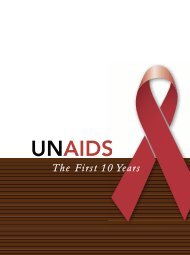Task Shifting - Global Recommendations and Guidelines - unaids
Task Shifting - Global Recommendations and Guidelines - unaids
Task Shifting - Global Recommendations and Guidelines - unaids
You also want an ePaper? Increase the reach of your titles
YUMPU automatically turns print PDFs into web optimized ePapers that Google loves.
<strong>Recommendations</strong> on creating an enabling regulatory environment for implementation<br />
Comment: This recommendation places high value on the need for governments to assess<br />
<strong>and</strong> identify the extent to which any existing mechanisms designed to guide <strong>and</strong> regulate the<br />
delivery of health services will, or will not, support the implementation of task shifting. Any<br />
changes must be in accordance with broader national policies, such as decentralization,<br />
labour, human resource management <strong>and</strong> financing <strong>and</strong> should include the active<br />
participation of people living with HIV/AIDS.<br />
Summary of findings<br />
The main objective of health-care regulation is to ensure a degree of accountability that will<br />
provide safety for service users <strong>and</strong> protection of health workers. Through regulatory approaches<br />
such as laws <strong>and</strong> proclamations, rules <strong>and</strong> regulations or policies <strong>and</strong> guidelines, countries are<br />
able to protect service users from malpractice <strong>and</strong> to foster conditions of trust between health<br />
workers <strong>and</strong> those they serve 84 85 .<br />
<strong>Task</strong> shifting involves organizing health-service delivery in new ways, which include changes to<br />
scopes of practice <strong>and</strong> the creation of cadres of health workers. These new ways of working may,<br />
or may not, be consistent with existing national regulations that pertain to the provision of health<br />
care.<br />
The steps that are required to ensure that task shifting can be properly accommodated <strong>and</strong><br />
supported within an appropriate regulatory framework will vary depending on the details of the<br />
existing regulatory approaches in any given country.<br />
Regulatory approaches may range in level of government versus non-government involvement 86 .<br />
At one end of this spectrum professional associations operate as primary regulatory institutions.<br />
They control the scope of practice, determine st<strong>and</strong>ards for good practice <strong>and</strong> oversee the<br />
conduct of members. They also provide expert guidance for legislators <strong>and</strong> administrators. At the<br />
other end of the spectrum is an institutional model of regulation that gives the lead role to the<br />
state to regulate health-care professionals.<br />
The differences between these two main types of regulation of health workers will have significant<br />
implications for countries seeking to change or adapt regulatory frameworks to support task<br />
shifting.<br />
However, adapting the regulatory framework to accommodate task shifting need not necessarily<br />
involve extensive changes in policy <strong>and</strong> legislation. Indeed, some countries may find that they<br />
have sufficient scope to implement task shifting within their existing laws <strong>and</strong> proclamations, rules<br />
<strong>and</strong> regulations, policies <strong>and</strong> guidelines. The degree of regulation required will also vary<br />
considerably depending on the types of task shifting that a country wishes to adopt or that are<br />
already taking place.<br />
There is considerable evidence in the literature of the ways in which certain high-income<br />
countries, such as Canada, Sweden <strong>and</strong> the United Kingdom, have adapted their regulatory<br />
frameworks to allow nurses to prescribe medication, a task that has traditionally been the<br />
responsibility of medical doctors 87-89 . There are also studies from resource-constrained countries<br />
on the extension of the role of nurses to include prescription privileges 62 90 91 92 93 .<br />
However, the use of mid-level cadres has proliferated, particularly in Africa, <strong>and</strong> appropriate<br />
adjustments to the regulatory framework have not always accompanied these changes to<br />
methods of service delivery 24 51 94 95 . Studies of community health worker programmes also note<br />
frequent failure to provide adequate systems support, including an appropriate regulatory<br />
framework 62 90 91 93 .<br />
The WHO-Commissioned Study on <strong>Task</strong> <strong>Shifting</strong> sought to assess <strong>and</strong> analyse the regulatory<br />
approaches used by a number of countries that are implementing task shifting in various forms<br />
Annex a<br />
.<br />
21

















